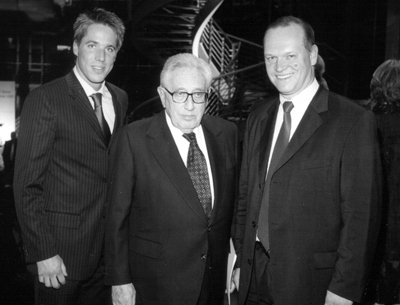
Awards dinner guest speaker Dr. Henry Kissinger (center) with Markus Feldenkirchen (left), one of the 2002 Burns Awards winners, and Robert von Rimscha (right), winner of the 2002 German-American Commentary Award.
Two Americans and one German took home the 2002 Arthur F. Burns Awards on May 23. Each year, the awards are given to Burns alumni for articles published the previous year. State Secretary Dr. Klaus Scharioth, representing the German Foreign Ministry, presided over the awards ceremony.
The $1,000 awards went to Tagesspiegel editor Markus Feldenkirchen (2002) and U.S. journalists Guy Raz (1999), London correspondent for National Public Radio (NPR), and James Hagengruber (2002), reporter for the Billings ( Mont.) Gazette. Feldenkirchen’s winning contribution, “Drei Kilometer vereinte Nationen (Three Kilometers of United Nations),” published in Der Tagesspiegel on Dec. 14, was a feature story about Devon Avenue in Chicago. Feldenkirchen reported on a two mile stretch of this road that is home to people from 46 nations.
Hagengruber, a correspondent on an Indian reservation in Montana, won with “Sitting Bull über alles (Sitting Bull Above All),” in which he explores the German infatuation with American Indians and their culture (Nov. 27, Salon.com). Hagengruber shared the award with Raz for his commentary “Mythos vom Tabu - Dürfen Deutsche Israels Politik kritisieren? (The Taboo Myth - Can Germans Criticize Israel’s Politics?)” Until recently Raz was an NPR correspondent in Germany. In his op-ed, which appeared on June 6 in Süddeutsche Zeitung, he argued that Germans have the right to criticize Israel and its politics publicly, and that Germans themselves - not Jewish journalists in Germany and abroad - are perpetuating this taboo.
Jan Heidtmann (1996) received honorable mentioned for “Eine Spur zu wenig (A missing Link),” about the criminal investigation that followed five Anthrax related deaths in the United States. This article appeared in Süddeutsche Zeitung magazine on May 10.
The German-American Commentary Award went to Robert von Rimscha, Der Tagesspiegel editor, for his editorial “Das verhasste Paradies (The Hated Paradise).”
He won the 1,000 euro award in a close race against three other entries. Von Rimscha analyzed Germans’ love-hate feelings toward the United States and predicted future power struggles between America and its allies. Last year he wrote prophetically, “If 2001 was the year the USA was shocked by terror, then 2002 will be the year America gave Bush the mandate to fight. In 2003, we will see the consequences. In Baghdad.”
2006 Burns Award Winners
2005 Burns Award Winners
2004 Burns Award Winners
2003 Burns Award Winners